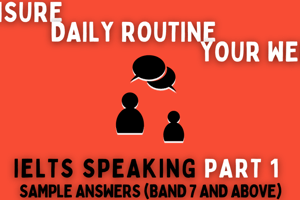Podcast
Questions and Answers
What percentage of the total marks in IELTS reading does vocabulary account for?
What percentage of the total marks in IELTS reading does vocabulary account for?
- 30-40% (correct)
- 40-50%
- 20-30%
- 10-20%
What is the suggested strategy for encountering new words in context?
What is the suggested strategy for encountering new words in context?
Read widely
One of the strategies for building vocabulary is to learn prefixes, suffixes, and roots to decode unfamiliar ______.
One of the strategies for building vocabulary is to learn prefixes, suffixes, and roots to decode unfamiliar ______.
words
Understanding the main ideas of a passage is essential for answering multiple-choice questions.
Understanding the main ideas of a passage is essential for answering multiple-choice questions.
Match the following vocabulary types with their descriptions:
Match the following vocabulary types with their descriptions:
What are the characteristics of distractor-based questions?
What are the characteristics of distractor-based questions?
True/false questions typically involve two options, true or false, to determine the correctness of a given statement.
True/false questions typically involve two options, true or false, to determine the correctness of a given statement.
What defines best answer questions?
What defines best answer questions?
What is item difficulty in the context of testing?
What is item difficulty in the context of testing?
What do grammar-based multiple choice questions test?
What do grammar-based multiple choice questions test?
What do error identification MCQs focus on?
What do error identification MCQs focus on?
What do sentence completion MCQs involve?
What do sentence completion MCQs involve?
Which of the following is a key concept in grammar multiple choice questions?
Which of the following is a key concept in grammar multiple choice questions?
What does subject-verb agreement focus on?
What does subject-verb agreement focus on?
What is a strategy for answering grammar multiple choice questions?
What is a strategy for answering grammar multiple choice questions?
Flashcards are hidden until you start studying
Study Notes
Vocabulary Building
- Importance of vocabulary in IELTS reading:
- Accounts for 30-40% of the total marks
- Helps to improve reading speed and comprehension
- Strategies for building vocabulary:
- Learn prefixes, suffixes, and roots to decode unfamiliar words
- Read widely to encounter new words in context
- Use flashcards or vocabulary apps to memorize words
- Practice active recall by trying to define words without looking at the meanings
- Focus on learning:
- High-frequency vocabulary (common words and phrases)
- Academic vocabulary (words related to academic topics)
- Collocations (words that frequently appear together)
Identifying Main Ideas
- Importance of identifying main ideas:
- Helps to understand the overall meaning of the passage
- Essential for answering multiple-choice questions
- Strategies for identifying main ideas:
- Read the title, headings, and subheadings to understand the topic and structure
- Identify the topic sentence (usually the first sentence of a paragraph)
- Look for keywords and phrases that indicate the main idea
- Skim and scan the passage to identify supporting details
- Techniques for identifying main ideas:
- Identify the author's purpose (e.g., to persuade, inform, describe)
- Recognize the tone and attitude of the author
- Identify the main idea of each paragraph and how they relate to each other
Vocabulary Building
- Vocabulary accounts for 30-40% of total marks in IELTS reading
- Building vocabulary improves reading speed and comprehension
- Learn prefixes, suffixes, and roots to decode unfamiliar words
- Read widely to encounter new words in context
- Use flashcards or vocabulary apps to memorize words
- Practice active recall by trying to define words without looking at the meanings
- Focus on learning high-frequency vocabulary, academic vocabulary, and collocations
Identifying Main Ideas
- Identifying main ideas helps understand the overall meaning of the passage
- Main ideas are essential for answering multiple-choice questions
- Read the title, headings, and subheadings to understand the topic and structure
- Identify the topic sentence (usually the first sentence of a paragraph)
- Look for keywords and phrases that indicate the main idea
- Skim and scan the passage to identify supporting details
- Identify the author's purpose (e.g., to persuade, inform, describe)
- Recognize the tone and attitude of the author
- Identify the main idea of each paragraph and how they relate to each other
Multiple Choice Questions
- Types of Multiple Choice Questions
- Distractor-based questions: one correct answer and multiple distractors (incorrect options)
- True/false questions: two options, true or false, to determine the correctness of a statement
- Best answer questions: multiple correct answers, but one is the best or most correct response
- Category-based questions: options are grouped into categories, and the correct answer is a category
- Roman numeral questions: options are labeled with Roman numerals, and the correct answer is a combination of them
Question Difficulty Metrics
- Item Difficulty: measures how difficult a question is for a group of test-takers, reported as a p-value (proportion of correct responses)
- Item Discrimination: measures how well a question distinguishes between high and low achievers, reported as a point-biserial correlation coefficient
Factors Influencing Question Difficulty
- Cognitive Complexity: the level of cognitive processing required to answer the question
- Knowledge Complexity: the amount of knowledge required to answer the question
- Language Complexity: the complexity of the language used in the question
- Contextual Complexity: the complexity of the context in which the question is presented
Types of Multiple Choice Questions in Grammar
- Grammar-based MCQs test knowledge of grammar rules, sentence structure, and word usage.
- Error identification MCQs require identifying errors in sentences, such as subject-verb agreement, tense consistency, and modifier placement.
- Sentence completion MCQs involve completing incomplete sentences with the correct grammatical structure.
Key Concepts in Grammar Multiple Choice
- Parts of speech include nouns, verbs, adjectives, adverbs, pronouns, prepositions, and conjunctions.
- Tense and aspect include present, past, and future simple, continuous, and perfect verb tenses.
- Clause and phrase structure involve independent and dependent clauses, phrases, and sentence fragments.
- Modifier placement requires correct placement of adjectives and adverbs in sentences.
- Subject-verb agreement ensures subject and verb agreement in number (singular or plural) and person (first, second, or third).
Strategies for Answering Grammar Multiple Choice Questions
- Read the question carefully to identify the task and what is being asked.
- Read the sentence carefully to identify the grammatical structure and any errors.
- Eliminate distractors by identifying and eliminating obviously incorrect options.
- Choose the best answer by selecting the option that best completes the sentence or corrects the error.
Studying That Suits You
Use AI to generate personalized quizzes and flashcards to suit your learning preferences.




